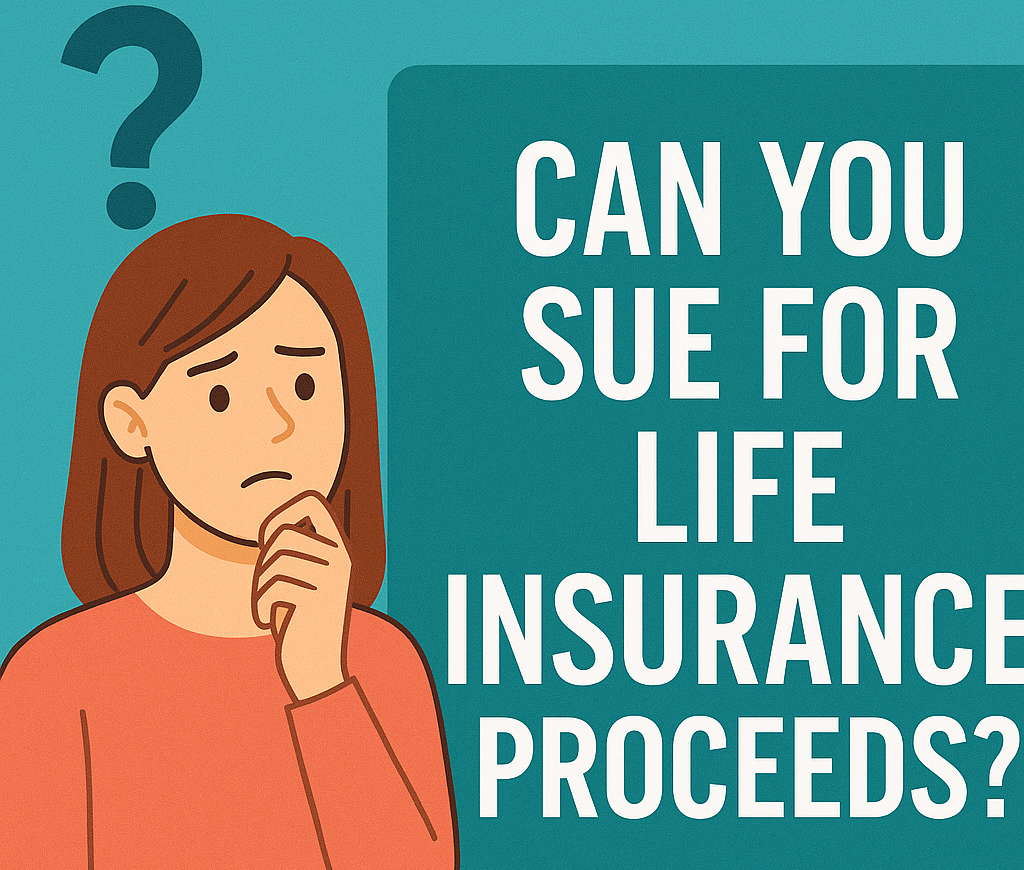Can You Sue for Life Insurance Proceeds? Life insurance can play a critical role in your overall financial plan, particularly if you are the primary provider for your family. You can name a beneficiary to receive the proceeds of your life insurance policy upon your passing. However, is it possible for you to sue for life insurance proceeds if they feel that the insurance company is unfairly rejecting their claim?

Generally, unless you are the policy’s designated beneficiary or have a legitimate legal justification for the payout, a person cannot file a lawsuit to recover life insurance proceeds. For instance, several beneficiaries may file a lawsuit if they can’t agree on how to split the proceeds. If a policyholder believes they were compelled to designate a specific beneficiary, they may sue for the life insurance proceeds.
The policyholder may have made the designation under duress or in a state of mental incapacity. In certain cases, the court may decide to invalidate the beneficiary designation after taking the evidence into account.
Who Can You Sue for Life Insurance Proceeds?
Determining whom to sue is a crucial step in any legal action to recover life insurance proceeds. The defendant in a case like this is usually determined by the nature of the dispute, but it could be any of the following parties:
Insurance providers
The most typical situation is bringing legal action against the insurance provider. When a claim is rejected or payment is delayed by the company without a good reason, this happens. These lawsuits usually stem from allegations of bad faith actions, such as improperly neglecting to investigate a claim or misrepresenting the terms of the policy.
Policyholder’s estate
The proceeds might be given to the policyholder’s estate if they were not designated as beneficiaries or if the beneficiaries listed have passed away. The estate may be the defendant in any dispute involving these proceeds, especially if it challenges the distribution in accordance with a will or state intestacy laws.
Third parties
Legal action may occasionally be taken against third parties, such as insurance brokers or agents, particularly if there is proof of fraud, misrepresentation, or carelessness in the administration of the policy or beneficiary designations.
Legal representatives
Generally, legal action may be taken against an executor or trustee who is handling the life insurance proceeds if there is disagreement over their choices or actions. Instances of purported mismanagement or fiduciary duty violations may give rise to this.
Who Is Entitled to Life Insurance Proceeds?
Beneficiaries must file a claim when the policyholder dies, submitting a claim form, policy, and death certificate. Also, beneficiaries cannot be entities like charities, family trusts, or businesses. Moreover, providers must release funds to the primary or contingent beneficiary as a backup if the primary beneficiary dies.
However, a non-beneficiary might be able to contest the proceeds in certain circumstances if:
- The policyholder made an attempt to modify the beneficiary but failed to follow through.
- When the policyholder named the beneficiary, there was doubt about their mental state.
- The life insurance form is invalid because it was not completed correctly.
- Due to coercion, undue influence, or fraudulent means, the policy was filed.
- Because the beneficiary contributed to the insured’s demise, they are ineligible.
Benefit payouts are typically subject to no restrictions or conditions, and the funds can be utilized for a variety of purposes, including living expenses, funeral costs, education, and savings for retirement, travel, and more.
Where Can I Sue for Life Insurance Proceeds?
You can sue for life insurance proceeds in the probate court managing the policy owner’s estate if you wish to challenge a beneficiary designation. Depending on jurisdictional circumstances, you might be able to start a case in federal or state court on your own if a probate case hasn’t already been started.
To contest a beneficiary designation, it’s crucial to consult an expert probate litigation attorney due to the complex legal requirements and difficulty in winning. Furthermore, an experienced attorney can advise on contesting a life insurance payout and resolving concerns effectively.
What Happens When You Sue for Life Insurance Proceeds
In essence, you are using the legal system to force an insurance company or other relevant party to pay the death benefits to the beneficiary or beneficiaries specified in the policy. The following general procedures could be followed if you sue for life insurance proceeds:
Speak with a lawyer
When getting a lawyer, it’s essential to comprehend your options. In addition, to find out how strong your case is and what your legal options are, speak with a lawyer who focuses on life insurance law.
File a lawsuit
Your lawyer will draft the required pleadings and court filings. Until the case is settled, the insurance company might have to give the court the death benefit.
Discovery process
The lawsuit’s filing will trigger the start of the discovery process. In order to bolster their claims, both parties exchange information during this process. Depositions, interrogations, and document requests are a few examples of this.
Negotiations
Discussions about a settlement and possible negotiations may take place between the parties during the discovery phase. Furthermore, the lawsuit may be dropped if a settlement is achieved.
Trial
The matter will proceed to trial if the parties are unable to come to an agreement. Moreover, the case will be tried by a judge or juries after both sides have presented their cases and arguments.
Judgment
The insurance company or any other party involved will be required to pay the death benefits to the beneficiary or beneficiaries named in the policy if the judge or jury finds in your favor.
Generally, a lawsuit seeking life insurance proceeds may involve a drawn-out and difficult legal procedure. Lastly, you should speak with a knowledgeable lawyer who can help you navigate the procedure and defend your legal rights.
Final Thoughts
In a life insurance lawsuit, the beneficiary will receive death benefits from the insurance company or other involved party within 30 days, and non-compliance will result in penalties. Also, the beneficiaries would be in charge of paying any taxes or fees after the case is settled. However, loss of a life insurance lawsuit results in death benefits not being received, and the court’s decision is final. The loser may be responsible for legal fees and costs, including those incurred by the insurance company or involved parties.






